The Corporate-Run Media – formerly “Mainstream Media”
MSM = Mainstream Media
Not every item of news should be published. Rather must those who control news policies endeavor to make every item of news serve a certain purpose.
Joseph Paul Goebbels
Nazi Propaganda Minister
We are grateful to the Washington Post, the New York Times, Time Magazine, and other great publications (the Mainstream/Mass-Media) whose directors have attended our meetings and respected their promises of discretion for almost forty years. It would have been impossible for us to develop our plan for the world if we had been subject to the bright lights of publicity during these years.
But, the world is now more sophisticated and prepared to march towards a world government.
The supernational sovereignty of an intellectual elite and world bankers is surely preferable
to the national auto-determination practiced in past centuries.
David Rockefeller
C.F.R. and Trilateral Commission Founder
“It is not enough for journalists to see themselves as mere messengers without understanding
the hidden agendas of the message and myths that surround it.”
John Pilger
“We [the Zionists] have it all under such control that no one – no one or no-body can [reach] people unless it is done through ‘our’ media control.
We have it sewed up!!”
Harold Wallace Rosenthal
from the Harold Wallace Rosenthal Interview 1976
‘In March, 1915, the J.P. Morgan interests, the steel, shipbuilding, and powder interest, and their subsidiary organizations, got together 12 men high up in the newspaper world and employed them to select the most influential newspapers in the United States and sufficient number of them to control generally the policy of the daily press…
They found it was only necessary to purchase the control of 25 of the greatest papers.’
U.S. Congressman Oscar Callaway, 1917
‘The world can therefore seize the opportunity [Persian Gulf crisis] to fulfill the long-held promise of a New World Order where diverse nations are drawn together in common cause to achieve the universal aspirations of mankind.’
George Herbert Walker Bush
from Wikipedia Website
Return to The Global Media Control
Agenda-Setting Theory
"The press may not be successful much of the time in telling people what to think, but it is stunningly successful in telling its readers what to think about."
—Bernard C. Cohen, 1963 [1]The Agenda-setting theory is the theory that the mass-news media have a large influence on audiences by their choice of what stories to consider newsworthy and how much prominence and space to give them.
Agenda-setting theory’s central axiom is salience transfer, or the ability of the mass media to transfer importance of items on their mass agendas to the public agendas.
History
Foundation
The Media Agenda is the set of issues addressed by media sources and the public agenda which are issues the public consider important (Miller, 2005). Agenda-setting theory was introduced in 1972 by Maxwell McCombs and Donald Shaw in their ground breaking study of the role of the media in 1968 presidential campaign in Chapel Hill, North Carolina. [2]
The theory explains the correlation between the rate at which media cover a story and the extent that people think that this story is important. This correlation has been shown to occur repeatedly.
In the dissatisfaction of the magic bullet theory, Maxwell McCombs and Donald Shaw introduced agenda-setting theory in the Public Opinion Quarterly. The theory was derived from their study that took place in Chapel Hill, NC, where the researchers surveyed 100 undecided voters during the 1968 presidential campaign on what they thought were key issues and measured that against the actual media content.
The ranking of issues was almost identical. The conclusions matched their hypothesis: The mass media positioned the agenda for public opinion by emphasizing specific topics (Hamm, 1998). Subsequent research on agenda-setting theory provided evidence for the cause-and-effect chain of influence being debated by critics in the field.
One particular study made leaps to prove the cause-effect relationship. The study was conducted by Yale researchers, Shanto Iyengar, Mark Peters, and Donald Kinder. The researchers had three groups of subjects fill out questionnaires about their own concerns and then each group watched different evening news programs, each of which emphasized a different issue.
After watching the news for four days, the subjects again filled out questionnaires and the issues that they rated as most important matched the issues they viewed on the evening news (Griffin, 2005). The study demonstrated a cause-and-effect relationship between media agenda and public agenda. Since the theory’s conception, more than 350 studies have been performed to test the theory.
The theory has evolved beyond the media’s influence on the public’s perceptions of issue salience to political candidates and corporate reputation (Carroll & McCombs, 2003).
Important Aspects of Theory
Functions of Theory
The agenda-setting function has multiple components
Media Agenda - issues discussed in the media (newspapers, television, radio)
Public Agenda - issues discussed and personally relevant to members of the public
Policy Agenda - issues that policy makers consider important (legislators)
Corporate Agenda - issues that big business and corporations consider important (corporate)These four agendas are interrelated.
Two basic assumptions underlie most research on agenda-setting:
the press and the media do not reflect reality, they filter and shape it
media concentration on a few issues and subjects leads the public to perceive those issues as more important than other issuesCharacteristics
Characteristics: research has focused on characteristics of audience, the issues, and the media that might predict variations in the agenda setting effect.
Need for Orientation: Research done by Weaver in 1977 suggested that individuals vary on their need for orientation. Need for orientation is a combination of the individual’s interest in the topic and uncertainty about the issue. The higher levels of interest and uncertainty produce higher levels of need for orientation. So the individual would be considerably likely to be influenced by the media stories (psychological aspect of theory) (Miller, 2005).
Issue Obtrusiveness: Research performed by Zucker (1978) suggested that an issue is obtrusive if most members of the public have had direct contact with it, and less obtrusive if audience members have not had direct experience. This means that agenda setting results should be strongest for unobtrusive issues because audience members must rely on media for information on these topics (Miller, 2005).Various Levels of Agenda Setting
First-level agenda setting This is the level that is most traditionally studied by researchers. In this level the media use objects or issues to influence the public. In this level the media suggest what the public should think about (amount of coverage).
Second-level agenda setting. In this level the media focuses on the characteristics of the objects or issues. In this level the media suggest how the people should think about the issue.
There are two types of attributes:
cognitive (sustentative, or topics)
affective (evaluative, or positive, negative, neutral)
Intermedia agenda setting (salience transfer among the media)
(Coleman and Banning 2006; Lee 2005; Shoemaker & Reese, 1996)Important Concepts
Gatekeeping - Control over the selection of content discussed in the media; what the public know and care about at any given time is mostly a product of media gatekeeping.
Priming - Effects of particular, prior context on retrieval and interpretation of information. The media's content will provide a lot of time and space to certain issues, making these issues more accessible and vivid in the public's mind (Miller, 2005).
Framing - Framing is a process of selective control over media content or public communication. Framing defines how a certain piece of media content is packaged so it will influence particular interpretations. This is accomplished through the use of selection, emphasis, exclusion, and elaboration. This is central to second-level agenda setting.Usage of Theory
political advertising
political campaigns and debates
business news and corporate reputation (Carroll & McCombs, 2003)
business influence on federal policy (Berger, 2001)
legal systems, trials (Ramsey & McGuire, 2000)
role of groups, audience control, public opinion
public relations (Carroll & McCombs, 2003)Strengths of Theory
It has explanatory power because it explains why most people prioritize the same issues as important.
It has predictive power because it predicts that if people are exposed to the same media, they will feel the same issues are important.
It can be proven false. If people aren’t exposed to the same media, they won’t feel the same issues are important.
Its meta-theoretical assumptions are balanced on the scientific side.
It lays groundwork for further research.
It has organizing power because it helps organize existing knowledge of media effects.Limitations
Media users may not be as ideal as the theory assumes. People may not be well-informed, deeply engaged in public affairs, thoughtful and skeptical. Instead, they may pay only casual and intermittent attention to public affairs and remain ignorant of the details.
For people who have made up their minds, the effect is weakened.
News media cannot create or conceal problems, they may only alter the awareness, priorities and salience people attached to a set of problems.
Research has largely been inconclusive in establishing a causal relationship between public salience and media coverage.References
1. Bernard C. Cohen, The Press and Foreign Policy, p. 120, Princeton University press, 1963
2. Maxwell McCombs, Donald Shaw, 'The Agenda-Setting Function of Mass-Media', in The Public Opinion Quarterly, Vol. 36, No. 2. (Summer, 1972), pp. 176-187.by Patrick Henningsen
New Dawn 156
May-June 2016
from NewDawnMagazine Website
By carefully controlling mainstream media and educational institutions, elite social engineers are able to control the flow of public discourse in order to serve their own goals and interests.
By doing this, they create something akin to 'consensus reality'...In other words, by controlling the perception of public consensus on any particular issue or event, you effectively control the prevailing ‘reality.’
A leading example of this social engineering phenomenon today is in the relentless promotion of war and global conflict throughout the media and education systems.
Their carefully coordinated efforts can be boiled down to a simple concept:
establishing legitimation and delegitimation in relation to the state or state institutions.In today’s formative education, school textbooks and assigned reading material are powerful tools used to shape students’ views.
Often what is imprinted in one’s memory is not particular details and facts but rather an atmosphere, an impression, or a tone.1
It can be argued this impression may be more influential in forming a pupil’s contextual world or nationalist view.
Professor of Education Dr. Michael H. Romanowski, explains:
"The authority of textbooks coupled with the 'objectivity' of the technical knowledge that they communicate encourages students to accept unquestionably the impressions and worldview created by the language of textbooks."
"Although textbooks claim rhetorically not to promote a particular understanding of history and to be objective, they advance a value-laden perspective of reality.
Because the selection and structure of knowledge affect our perception of the world, the language and context used to articulate knowledge are crucial. Textbook authors select particular language that creates impressions in the minds of students.
These impressions have power and authority because they are presented in the printed and bound textbook with its aura of an authority that is beyond question and criticism.
Although textbooks are used in many different ways, they are still dominant and powerful educational tools that shape students' views."
SourceIn his study Romanowski goes on to describe how through the careful use of language, US school textbooks depicted Japanese internment camps in the United States during World War II in a manner that marginalized Japanese-Americans, while subtly mitigating any real criticism of the US government’s actions.
Some might call this indoctrination, while others may call it brainwashing.
Much of the ideological instruction for educational institutions is provided through the global governance system run and funded by multilateral institutions like the United Nations and the World Bank.
The global management and cultural continuity of this European and North American-led ‘soviet’ is run by a myriad of Non-Governmental Organisations (NGOs), specifically through the UN’s “Agenda 2030”, a set of global directives for the next two decades.
Previously these were the UN “Millennium Goals” which have since been overhauled and upgraded by the self-appointed culture experts and social engineers in New York City and Geneva.
Through this globalised system, social engineers are able to streamline language and political thought internationally, while simultaneously preparing the next generation to accept a new sanitized political reality…
In the last two decades, the corporate mainstream media’s efforts to spin endless war narratives on behalf of the state and its defence industry have become more pronounced. Despite numerous critiques and thousands of online articles and activist campaigns, the Establishment is simply doubling-down on their positions.
Australian journalist and filmmaker John Pilger has emerged as one of the leading voices in recent generations exposing institutional Western war propaganda.
He is also one of the few members of the media to challenge the carefully crafted “man of peace” US President Barack Obama.
Pilger writes:
"In 2009, President Obama stood before an adoring crowd in the centre of Prague, in the heart of Europe. He pledged himself to make 'the world free from nuclear weapons'.
People cheered and some cried. A torrent of platitudes flowed from the media. Obama was subsequently awarded the Nobel Peace Prize.
It was all fake. He was lying...
The Obama administration has built more nuclear weapons, more nuclear warheads, more nuclear delivery systems, more nuclear factories. Nuclear warhead spending alone rose higher under Obama than under any American president.
The cost over thirty years is more than $1 trillion." 2Regarding the lack of due diligence and complicity by the mainstream media, Pilger adds:
"Had journalists and broadcasters done their job and questioned the propaganda that Saddam Hussein possessed weapons of mass destruction.
Had the lies of George W. Bush and Tony Blair not been amplified and echoed by journalists, the 2003 invasion of Iraq might not have happened, and hundreds of thousands of men, women and children would be alive today."From these examples, it’s easy to see how the state, the education system, and the media all compliment each other to manufacture Western public consent for the business of global military adventurism.
Today, much less visible new means of control are being perfected.
Digital monopolies are run by mega-corporations like Google whose vast informational and ‘smart’ data networks allow a relative handful of people to exert enormous influence over billions of people – without them ever knowing what is happening behind the curtain.
From a social engineering perspective, this could be described as a form of mass mind control…
By employing various strategies designed to manipulate search engines and their results, any cabal can influence public opinion on a range of subjects and issues – which in turn help determine which policies are implemented, political outcomes, and even what laws are passed.
Once again, by controlling consensus reality, elites create the reality of their choosing.
Writer Robert Epstein provides some insight into how something as simple as searching for information has been commoditized and modeled by the digital overlords at Google.
He explains:
"The Google search engine is so good and so popular that the company's name is now a commonly used verb in languages around the world.
To 'Google' something is to look it up on the Google search engine, and that, in fact, is how most computer users worldwide get most of their information about just about everything these days. They Google it...
Google has become the main gateway to virtually all knowledge, mainly because the search engine is so good at giving us exactly the information we are looking for, almost instantly and almost always in the first position of the list it shows us after we launch our search - the list of 'search results'." 3Another disturbing trend is the state’s increasing role in administrating intellectual tyranny in the 21st century.
This idea goes much deeper than just state snooping on its own citizens when you consider the consequences of people becoming afraid or overly self-conscious about which web pages to visit or which search terms they input into Google.
What happens when our private lives become public property?
In the world’s premier police state, the UK, Home Secretary Theresa May recently announced a new bill, known as the “Snooper’s Charter,” which gives Orwellian powers to the state and its security services for tracking UK citizens’ Internet use and web browsing history dating back two years – without the need for any judicial check.
Similar invasive measures have already been passed in Australia.
Technocrat May was accused of rushing the new surveillance laws into place in order to avoid more public scrutiny from critics and civil liberties groups.
When asked, one anonymous government source provided The Independent newspaper with the standard party line:
"Terrorists and criminals are operating online and we need to ensure the police and security services can keep pace with the modern world and continue to protect the British public from the many serious threats we face." 4This sounds like a line straight out of Terry Gilliam’s film, Brazil.
Scottish comedian Frankie Boyle tries to make light of this situation:
"No more drunken Googling: all it takes is a misspelled search for 'bong-making' and suddenly you'll be in an orange jumpsuit getting beaten with a pillowcase full of bibles."He continues:
"This law will create lots of new jobs, as the person charged with reading all our communications (who will see more unsolicited erections than customer services at Skype) will regularly feed their screaming face into a meatgrinder." 5Once again, governments continue to recycle the same tired old talking point by insisting,
'the only people who need worry are those who have something to hide'...If that’s the case,
shouldn't we be allowed to snoop on the state...?They really shouldn’t mind…
It is every citizen’s duty to know everything the state and its corporate partners are up to.
Footnotes
'Problems of Bias in History Textbooks' by Michael H. Romanowski
'A World War Has Begun' by John Pilger
'The New Mind Control. "Subliminal Stimulation", Controlling People without Their Knowledge' by Robert Epstein
'Snooper's charter: Theresa May to present revised Investigatory Powers Bill with tougher privacy protections' by Nigel Morris, The Independent, 1 Mar 2016
'The snooper's charter: one misspelled Google search for "bong-making" and you'll be in an orange jumpsuit' by Frankie Boyle, The Guardian, 11 Nov 2015by Paul Street
December 12, 2018
from CounterPunch Website
Spanish version
Photo Source Dmitry Dzhus
CC BY 2.0
The deletion of events that don’t fit with the reigning ideology is part of how ruling class-owned media works to manufacture mass consent to unjust hierarchy.
I spent much of last week in a cable-television-equipped U.S.-American apartment with CNN, MSNBC, and FOX News at my fingertips.
As I inhabited this abode, flicking between sports and cable news, a political crisis of the state was unfolding in one of the world’s richest and most powerful states.
France was gripped by an historic working- and middle-class uprising.
In the biggest popular unrest seen there since May of 1968, many hundreds of thousands of Gilets Jaunes (“yellow vests”) took to French roadways and other public space in their fourth straight week of explosive mass protests.
As Gilbert Mercier wrote last Friday:
"From the Island of La Reunion to the Napoleonic symbol that is the Arc de Triomphe, through big and small towns, as well as the usually bucolic countryside in France, there is something special in the air:
the smell of fires on barricades, the smoke of tear gas, the anger built upon decades of inequality, injustice and despair for most.
Among the Gilets Jaunes, many understand intuitively that the current democratic process is dead, and therefore the only option is the occupation of streets and roads.
History usually moves at a snail's pace, but sometimes a series of events abruptly push societies to a breakdown, to the fascinating and somewhat beautiful and chaotic quantum leap that is a revolution...
It is still premature to call the Gilets Jaunes movement a revolution, but one can say categorically that this unexpected and spontaneous grassroots movement has put France on track for the preliminary stages of such a dramatic event."As in previous weeks, the yellow traffic vest-wearing crowds did not turn out to politely carry signs and hear speeches.
They burned rich folks’ cars, trashed bourgeois luxury stores, smashed banks, set up fiery barricades, and engaged in running street battles with tear-gas-wielding and water cannon-spraying riot squads.
The number of street rebels remained high – 125,000 or more (300,000 came out on November 17th) – last Saturday even as the government deployed 89,000 police officers to contain the rebellion.
The absurdly unpopular French president, Emmanuel “Hot for Teacher” (HfT) Macron, largely disappeared from public view behind rings of heavily armored protection at his presidential palace.
There was talk of Macron calling out the national army to suppress the revolt.
The establishment French media blamed the disturbances on a minority of right-wing and left-wing “extremists” and destructive “casseurs” (vandals and rioters).
In reality, the great majority of protestors were ordinary and politico-economically exasperated working-poor and middle class citizens not affiliated with either the far right or the left.
The extraordinarily spontaneous and leaderless Gilets Jaunes movement was supported by nearly 80 percent of the French citizenry.
Beneath the pre-revolutionary protests lay a broad popular sense that the arrogant neoliberal former investment banker Macron is,
"the president of the rich."The trigger behind the rolling street agitation and angry crowd behavior came four weeks ago when the government raised taxes on petrol in the name of curbing the climate crisis.
The tax sparked road blockades by suburban, ex-urban, and rural French working people, who spend inordinate parts of their largely stagnant incomes on gas thanks in part to their inability to afford the high cost of living in the cities where most of the jobs are located.
The gas levy – repealed by Macron in an effort to place the automobile-torchers last week – was just the proverbial straw that broke the camel’s back.
The demonstrations swelled into a broader protest against the bourgeois president’s whole neoliberal agenda.
HfT Macron’s provocative measures have included,
slashing taxes on the wealthy Few (to "spur investment," of course)
hiking pensioners' taxes
reducing housing allowances
weakening business regulations
curbing union powers
an educational "reform" that will make it more difficult for young people to attend colleges and universities...The Gilets Jaunes’ diverse and diffuse demands (there is no centralized yellow vest leadership or agenda/policy platform at this point) go far beyond the repeal of the gas tax.
They include,
reinstatement of the nation's wealth tax (the "solidarity tax on wealth"/Impôt de solidarité sur la fortune or ISF)
increases in the minimum wage and the minimum pension to 1300 Euros a month
government jobs programs
higher taxes on big companies
rent ceilings
expanded mental health services
a general rollback of austerity policiesYellow vest-wearers demand real democracy – popular self-rule.
They have called for a popular referendum whereby 700,000 citizen signatories would force the French Parliament to debate and vote on a law within one year.
There have been calls (evoking memories of the great French Revolution of 1789) for a Constituent Assembly to draft a new Constitution meant to create a new French government – a Sixth Republic based on popular sovereignty and majority rule, not the plutocratic commands of a de factocorporate-financial dictatorship.
Imagine…!
Calls for Macron’s resignation have been prominent in Gilets Jaunes rhetoric and graffiti.
Many, probably most French people want a new and genuinely democratic government now, not on the ridiculously time-staggered scheduled imposed by an outdated Constitution.
Despite predictable attempts by the right to hijack the movement and notwithstanding an absence of coordination by Left parties or unions, France is experiencing a left-leaning popular and working-class uprising consistent with the French revolutionary tradition of “Liberty, Equality, and Fraternity.”
It is not a neo-fascist or anti-immigrant or anti-environmental petit-bourgeois rebellion.
As Mercier writes:
"...What the yellow vests of the Gilets Jaunes symbolizes is blue-collar workers, struggling retirees and students who revolt against the suits of the political class and CEOs…
The Gilets Jaunes movement is strictly horizontal, without a hierarchy or recognized leaders.
It has, so far, refused to be hijacked by political parties:
either the Rassemblement Nationale of Marine Le Pen on the far-Right, or La France Insoumise of Jean-Luc Melenchon on the Left.
It has also rejected association with French labor unions.
Without spelling it out, the Gilets Jaunes movement is anti-capitalist:
a guttural revolt of the have-nots against the elite.
It is a popular, not a populist, movement.
Europeans and even American populist-nationalists are already distorting the Gilets Jaunes' significance to serve their political agenda.
As opposed to the rise of nationalism-populism elsewhere, such as in,
Italy
Austria
Hungary
the UK as expressed by BREXIT
the US
Brazil with the election of Bolsonaro,
...the Gilets Jaunes do not have an anti-immigration or even an anti-EU agenda that reeks of racism and neofascism...
The Gilets Jaunes are in revolt against capitalism or neoliberalism, which is a worldwide system of concentration of wealth and power into a few hands.
With our pending ecological collapse and vanishing biodiversity, capitalism has failed and is reaching its end game.
Unlike the neofascist science deniers, the Gilets Jaunes perceive climate change as a crisis, but they say that it is hard to focus on a global ecological collapse when you live from paycheck to paycheck.
They feel that they deal with the anxiety of putting food on the table at the end of the month while the rich talk about the end of the world...
Thinking about humanity's survival is hard to do on an empty stomach."The Gilets Jaunes have resisted the nativism of the nationalist right.
They have called not for closed borders but rather for improved integration policies to help foreigners settle in France (language and civic education), for all foreign citizens working in France to have the same labor rights as French citizens, and for policies that address the causes of forced migrations.
The yellow vest uprising was/is no small development in a nation that is a leading nuclear power and one of just five permanent member of the United Nations Security Council!
You wouldn’t have known it from U.S. cable news last week or weekend, however.
The chatterboxes on CNN, MSNBC, and FOX News could barely break from their week-long commemoration of the imperialist war criminal George H.W. Bush and their breathless reporting of the latest developments in Bob Mueller RussiaGate investigation to give any serious attention to the momentous events in France.
To be sure, the death of a U.S. president is always a big Orwellian deal for dominant U.S. media. The RussiaGate news (prosecutorial sentencing recommendations for former Trump cronies Michael Flynn and Michael Cohen) was significant.
But the near-blackout on France was over-the-top and quite telling given the world-historic import of the story unfolding in one of the world capitalist system’s crown-jewel core states – a great Western nation-state whose history has been intimately linked to that of the United States since before and during the American Revolution.
My limited viewing sample last week suggested that FOX News gave the Gilets Jaunes more – and more sympathetic – coverage than did CNN and MSDNC.
That’s probably because Trump state television (FOX) identifies more with the creeping fascist anti-immigrant French right-wing (Marine Le Pen’s National Front) than it does with the neoliberal Macron – and because FOX joined Trump in finding it useful to misrepresent the Yellow Jackets’ opposition to the petrol tax as a rejection of positive climate action.
Macron is more fashionable and popular at “progressive-neoliberal” CNN and MSNBC.
Still, since the Yellow Jackets have risen up against capitalism in a popular and anti-capitalist movement. Arch-capitalist FOX wasn’t eager to pay all that much more attention to the street-fighting men and women of France than did the Obama-Macronists at CNN and MSDNC.
There’s a very simple reason I had to turn to the Internet to get any decent coverage and commentary on the yellow vests.
The problems that have pushed ordinary French people into the streets and to support those ready to destroy bourgeois property are widely present – more present, in fact – in the United States.
The U.S. is more plagued than any other rich Western nation by the,
savage inequality (of both condition and opportunity)
plutocracy
corruption
insecurity/precariety
debasing soullessness of contemporary eco-cidal capitalism,…and of a constitutional political set-up that is badly out of step with the needs of its embattled working-class majority.
We, too, suffer from the horrid arrogance of a corrupt, out-of-touch political class that represents the rich, not “We the People,” in the corridors of policy and power.
As the distinguished liberal political scientists Benjamin Page (Northwestern) and Marin Gilens (Princeton) showed in their expertly researched book ‘Democracy in America?’ last year,
"the best evidence indicates that the wishes of ordinary Americans actually have had little or no impact on the making of federal government policy.
Wealthy individuals and organized interest groups - especially business corporations - have had much more political clout.
When they are taken into account, it becomes apparent that the general public has been virtually powerless… The will of majorities is often thwarted by the affluent and the well-organized, who block popular policy proposals and enact special favors for themselves…
Majorities of Americans favor… programs to help provide jobs, increase wages, help the unemployed, provide universal medical insurance, ensure decent retirement pensions, and pay for such programs with progressive taxes.
Most Americans also want to cut 'corporate welfare.' Yet the wealthy, business groups, and structural gridlock have mostly blocked such new policies [and programs]."We, like the French, get to vote? Super!
Mammon reigns nonetheless in the United States, where, Page and Gilens find,
"government policy… reflects the wishes of those with money, not the wishes of the millions of ordinary citizens who turn out every two years to choose among the preapproved, money-vetted candidates for federal office".Plus ca change, plus c’est la meme chose…
“World’s great democracy?”
University of Kentucky history department chair Ronald Formisamo’s latest book is titled volumes, American Oligarchy – The Permanence of the Political Class (University of Illinois, 2017).
By Formisamo’s detailed account, U.S. politics and policy are under the control of a “permanent political class” – a “networked layer of high-income people” including,
congressional representatives (half of whom are millionaires)
elected officials
campaign funders
lobbyists
consultants
appointed bureaucrats
pollsters
television celebrity journalists
university presidents
executives at well-funded nonprofit institutions...This “permanent political class,” Formisamo warns, is taking the nation,
"beyond [mere] plutocracy" to "the hegemony of an aristocracy of inherited wealth."It,
"drives economic and political inequality not only with the policies it has constructed over the past four decades, such as federal and state tax systems rigged to favor corporations and the wealthy.
It also increases inequality by its self-dealing, acquisitive behavior as it enables, emulates, and enmeshes itself with the wealthiest One Percent and .01 percent …
[It engages in] the direct creation of inequality by channeling the flow of income and wealth to elites [while]… its self-aggrandizement creates a culture of corruption that infects the entire society and that induces many to abuse positions of power to emulate or rise into 'the One Percent'…
[And as it] contributes to continuing high levels of poverty and disadvantage for millions that exceed almost all advanced nations."We also chafe under the limiting of our supposed grand “input” on excessive executive branch power to preposterously time-staggered elections scheduled by an archaic Constitution.
“Our” decrepit charter was drafted and passed behind locked doors by and for wealthy slaveholders and merchant capitalists for whom popular sovereignty was the ultimate nightmare during the time of Louis XVI.
We, too, are badly overdue for another revolution and the holding of a national Constituent Assembly to draft a new Constitution based on real popular sovereignty and the advance of the common good and over and against the unelected and environmentally catastrophic dictatorship of capital.
Thanks to all of this and more, the yellow vests could prove highly contagious to millions of ordinary U.S.-Americans if the French movement was give anything like the coverage it deserves in “mainstream” U.S. media.
Hence the ruling-class “mainstream” cable networks’ near blackout of the Gilets Jaunes…










